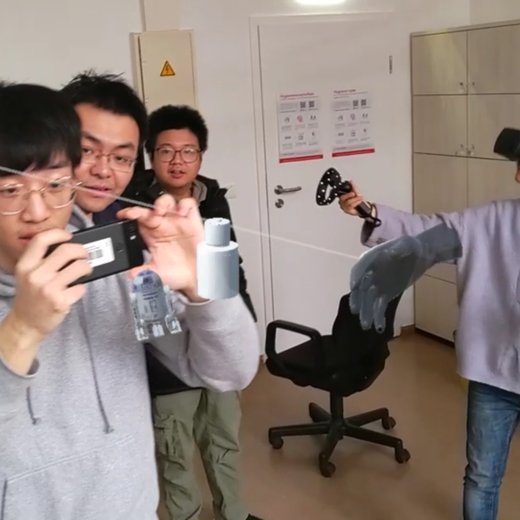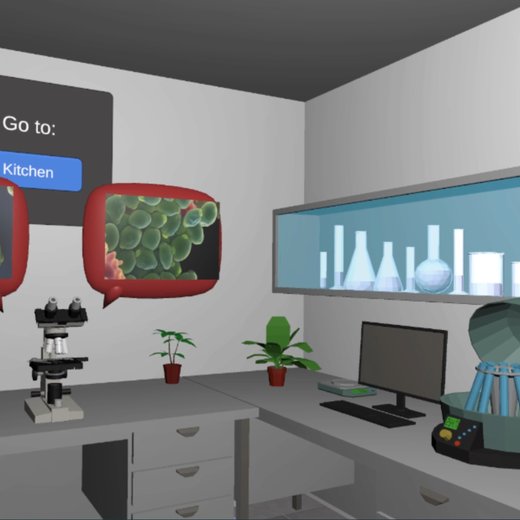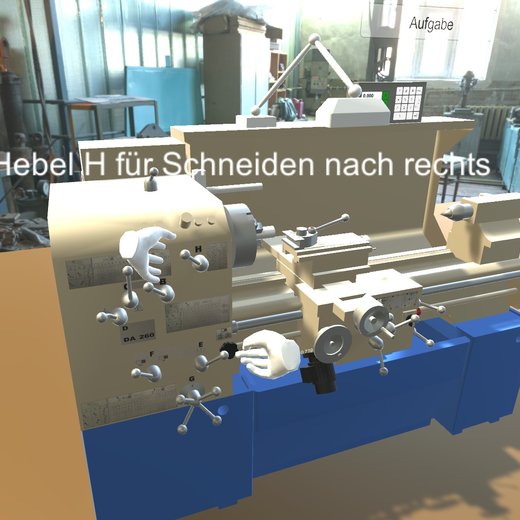Students, please read here:
-
Do you have a topic for me?
Some general questions and answers:
- Q: Do you have a topic for my thesis?
A: See below, sometimes there are some ideas. You may also send me your own idea.
- Q: I can't do programming. Can I do a thesis with you?
A: You "may" do it, but I don't think I can suggest good topics to you.
- Q: Do you have a template for my thesis / report?
A: You can find templates here: Marc Enzmann.
- Q: How can I schedule a meeting with you?
A: See file "howtoMeeting.pdf" below.
- Q: Do you have a topic for my thesis?
-
Current ongoing internal theses and internships
Currently the following theses and internships are supervised by Prof. Tümler and make use of the xR lab (working titles):
- Master, Biomedical Engineering: Melis Alptekin, "VR Biotech-House Laboratory"
- Master, Biomedical Engineering: Dilan Ilke Kurt, "VR Telepresence"
- Master, Electrical Engineering: Eduard Sariiev, "Random-Dot Kinematogram in AR"
- Master, Electrical Engineering: Ivan Kutsyianov, "AR Robot navigation planning"
- Masterarbeit, Interactive Media: Kseniia Krylova, "VR Biotech-House wine production"
- Bachelor, Mechanical Engineering: Jincheng Li, "VR lathe: dynamic mesh changes during processing of the workpiece"
- Master, Biomedical Engineering: Muhammad Jawaid, "Comparison of tracking systems"
- Internship, Media Technologies: Maximilian Sterz, "Development and Evaluation of a dynamic tool to reduce batches / setpass calls in Unity""
Besides these lab theses, there are candidates supervised outside of the lab.
-
Finished reports and projects
Theses finished internally at prof. Tümler's lab:
- 2023, Bachelor, Applied Computer Science: Kevin König "Evaluierung des Einflusses von virtueller Realität auf die sequentielle Informationsverarbeitung des Menschen mittels Random-Dot-Kinematogrammen" (Evaluation of the influence of VR on human sequential information processing by use of random-dot-kinematograms)
- 2023, Bachelor, Applied Computer Science: Jonas Bongartz "Vergleich der Umsetzung eines VR-Projektes zwischen Unity und der Unreal Engine 5" (Comparison of Unity and Unreal Engine 5 by use of a VR project)
- 2023, Master, Biomedical Engineering: Ahmed Umer, "Teaching Tracking System: Developing a Low-Cost Multi-Sensor Tracking System for Virtual and Mixed Reality Education"
- 2023, Master, Biomedical Engineering: Juan Felipe Diaz Quintero "Development of a Didactic VR Tool for Minimal Invasive Surgery" (Video)
- 2023, Master, Biomedical Engineering: Mohsin Amjad, "Implementation of Eye Tracking in Virtual reality Lathe Machine"
- 2023, Master, Biomedical Engineering: Gerald Justin Goenawan "Investigation of Scene Management Implementation on a Virtual Reality Biotech House in Unity"
- 2022, Bachelor, Mechanical Engineering: Peiyuan Wang "Exploration von WebAR/VR für die Lehre"
- 2022, Bachelor, Mechanincal Engineering: Yifan Shi "Vollständiges Praktikum an der VR-Drehmaschine" (complete lathe process in VR) - (Video)
- 2022, Master, Biomedical Engineering: Mary Igbudu "Analysis of Eye-Tracking Data in Virtual Reality - In Correlation to Medical Educational Result" - see conference publication: 5th VR AR Learning Workshop
- 2022, Bachelor, Mechanical Engineering: Jiaming Jiang "Konvertierung einer interaktiven Virtual Reality Anwendung für den 2D-Monitor"
- 2021, Master, Interaktive Medien: Rong Huang "Konzept eines Biotech-Hauses in Virtual Reality
am Beispiel der Joghurt-Herstellung" (German language, Video) - see conference publication: 5th VR AR Learning Workshop - 2021, Master, Data Science: Mingjian Liu "xR-Szenensynchronisation zwischen unterschiedlichen Plattformen" (German language)
- 2021, Master, Biomedical Engineering: Angela Odame "Virtual Reality as a Teaching Tool in Cardiac Anatomy Education" - see HCI International publication
- 2021, Master, Biomedical Engineering: Alp Toprak "Investigation of Visualizing Interaction Metaphors to enable Collabration for Augmented and Virtual Reality on Multi-Plaforms for Medical Applications" - see HCI International publication
- 2021, Bachelor, Mechanical Engineering: Yuntao Xu "Simulation der Drehmaschine in Unity Engine und deren Interaktion durch VR Geräte" (German language)
- 2020, Master, Biomedical Engineering: Manisha Balani "Investigation of Interaction Metaphors for Augmented and Virtual Reality on Multi-Platforms for Medical Applications" see HCI International publication
A selection of theses-independend student projects finished at prof. Tümler's lab:
- 2023, Practical Internship Bachelor, Maschinenbau: Jincheng Li, "Virtual PlayDoh: Knete in VR simulieren" (English title would be: "Simulate Virtual PlayDoh in VR")
- 2023, Project, Master, Data Science, Juan Enrique Erazo Sanchez: "KI-based analysis of eye tracking data (successor of this thesis): Creation and training of a model, test with eye tracking data of previous study"
- 2023, student project, Bachelor Medientechnik: "Arduino basierte Unity3D Steuerung"
- 2022, Directed Research Studies, Master Biomedical Engineering:"Evaluation of Azure Kinect DK, Demo Application and comparison with Kinect V2"
- 2022, Directed Research Studies, Master Biomedical Engineering: "Demo Application for HoloLens2" and manual "How to create new HoloLens2 projects with Unity"
- 2022, student project, Master Biomedical Engineering: (Video link) "Hip Joint Surgery in VR"
- 2021, student project, Master Biomedical Engineering: "Identification and evaluation of alternatives to Unity which are not under U.S. Sanction list"
- 2020, student project, Master Electrical Engineering: (Video link) "Lern-Tracking-System zum Einsatz in der Lehre" (German language)
- 2020, student project, Bachelor Elektro- und Informationstechnik: (Video link) Überprüfung und Inbetriebnahme eines LC80 Lerncomputers aus der DDR (German language)
Ideas for new student / thesis projects
-
xR Monster
What does that mean?
-
We want to combine the best technologies available for us into one system: HaptX Gloves (haptic gloves), bHaptics Vest (haptic vest), Varjo XR3 (best VR glasses) -> an xR monster!
-
We want to compare this system against a standard VR system: How good is the immersion, the presence, the effectiveness?
-
What evaluation software should we use for this? We need software on the highest level, best possible quality and integration of the vest+gloves! Maybe we use Half Life Alyx as evaluation software for this?
What skills are needed (or maybe can be learned) during the project?
- Programming (you must already have skills)
- Unity (you must already have skills)
What target group is this field suitable for?
- Students of computer science
- maybe: students of electrical and computer engineering, biomedical engineering or digital media technologies
What are tasks you could work on in a project?
- Combining all systems (vest, gloves, goggles) into a separate Unity project.
- Contacting Varjo, HaptX and bHaptics as well as Valve to discuss how we can use the technologies in a study.
- Conducting a study (standard system: HP Reverb G2, against the "xR-Monster").
-
-
Robots and xR
What does that mean?
- We are in need of an application for the EduXBot-project to help inhabitants of nursing homes to keep their cognitive abilities.
- A simple VR escape room or VR puzzle room should be developed.
- What are suitable tasks for inhabitants of nursing homes?
- Should the application be used only seated or can the users stand while using the software?
- Are there multiple difficulty levels?
What skills are needed (or maybe can be learned) during the project?
- Programming (you must already have skills)
- Unity (you must already have skills)
- 3D-modelling (can be learned in the project)
What target group is this field suitable for?
- All students of department 5, 6, 7 (depends on skills!)
What are tasks you could work on in a project?
- Development of one or more VR Escape/Puzzle rooms in Unity for Pico 4 VR-glasses
- Creation of suitable 3D models
- Possible puzzle tasks:
- Find a hidden key in a box to open a door
- balance a weighing machine to open a drawer
- …
-
First-Aid with HoloLens 2
What does that mean?
- We have a first-aid-dummy in our xRLab.
- We want to extend the dummy with new electronics to tell us, if users have done the first-aid-steps correctly.
- All tasks to be done by the trainee should be visualized in HoloLens 2 AR-glasses.
- Through that the trainee will get a response if and how the tasks have been completed.
What skills are needed (or maybe can be learned) during the project?
- Programming (you must already have skills)
- Electronics (you must already have skills)
- Unity (you must already have skills)
What target group is this field suitable for?
- Students of Biomedical Engineering
- maybe students of computer science or electronics and computer engineering
What are tasks you could work on in a project?
- Fit the dummy with electronics
- Analysis and processing of sensor data
- Transfer of data to HoloLens 2
- Visualization of sensor data in HoloLens 2
- Design and implementation of AR visualizations to explain work steps in HoloLens 2
-
Multi-User Multi-Plattform Collaboration

What does that mean?
- See this example video: Video
- Multiple (AR, VR, MR) xR-systems collaborate in one shared xR experience.
- Can an AR-smartphone user collaborate with a VR-headset user?
- What problems can evolve from that? (VR-controller vs. smartphone-screen-tap vs. hands-free-interaction)
- How can these problems be overcome, so that the individual choice of the xR device/platform has an as-low-as-possible influence on the experience?
What skills are needed (or maybe can be learned) during the project?
- Programming (you must already have skills)
- Unity (you must already have skills)
- Network communication (can be learned)
What target group is this field suitable for?
- Students of computer science
- maybe: students of electrical and computer engineering, digital media technologies if good programming skills are available
What are tasks you could work on in a project?
- Convert an existing Unity 2019 project to a newer Unity version
- implement a marker-based / qr-code registration between the AR/VR systems
- Retreive SpatialData from a Windows Mixed Reality VR-system and from Android
- Data management - when, why, how are data synchronized efficiently between the xR platforms?
- try to use Mixed Reality Toolkit (MRTK) with CardboardVR (currently this is not possible, but it would be very interesting if that was available)
-
VR Biotech-House

What does that mean?
- See example video: Video
- We continuously meet bio-technological products in our daily life: Soap, yoghurt, yeast, etc.
- We present a "daily life house" in VR, in which people could live.
- On defined places in the house one can find bio-technological products. These can either be produced within the VR-simulation or you can get information on how to produce them.
What skills are needed (or maybe can be learned) during the project?
- Programming (you must already have skills)
- Unity (you must already have skills)
- 3D-modelling (can be learned in the project)
What target group is this field suitable for?
- All students of department 5, 6, 7 (depends on skills!)
What are tasks you could work on in a project?
- Extend our existing project by additional scenarios: Production of
- bread,
- beer,
- citric acid,
- detergent enzymes,
- insulin,
- penicillin,
- cellulose,
- compost,
- bio fuels,
- ...
- Also interesting would be the animation of micro-organisms and -cultures
-
xR Technologies (3D, haptics, eye tracking, ...)
What does that mean?
- This is not a real "project", but it includes interesting topics that can be used to do a project, independent of the other ongoing projects.
What skills are needed (or maybe can be learned) during the project?
- Programming (you must already have skills)
- Unity (you must already have skills)
What target group is this field suitable for?
- All students of department 5 and 6
What are tasks you could work on in a project?
- 3D-monitor LookingGlass 16" and LeapMotion:
The "LookingGlass" is an autostereoscopic 3D-monitor. Some of our VR scenarios might be tried out on the device to do a comparative study on how users perform with the 3D-monitor based display compared to work with "regular" VR. A demo application is available. - EyeTracking:
We have multiple AR/VR glasses with integrated eye-tracking capabilities. This allows the human eyes to become an interactor in AR/VR scenes. You gaze at an object and it will react!
What could we do with that? Here are some ideas for thesis projects:- We could investigate if users find relevant information - and if not, we provide help.
- We could re-think interaction: Only when people look at specific objects, interaction will be possible.
- Eye movements could be analysed in an off-line procedure to understand how a person used the xR scenario.
- Set up and explore Mozilla Hubs:
Mozilla Hubs is a platform to create a shared xR experience for multiple 3D/VR users. Maybe we can set up our own server? - VR-tele-hands:
(Watch this video first) Bi-directional control of robotic hands, sensors and haptic VR gloves (depending on focus: programming in unity, 3D models, phyical set up, electronics, 3D printing, etc.)
-
Computer Graphics
What does that mean?
- These are ideas that deal with optimization of xR-scenes.
What skills are needed (or maybe can be learned) during the project?
- Programming (you must already have skills)
- Understanding of the CPU/GPU pipeline (mandatory)
- Unity (you must already have skills)
What target group is this field suitable for?
- Students of computer science
- maybe students of electrical and computer engineering
What are tasks you could work on in a project?
- Shader development: Clipping-Shader to simulate a field of view (simulation of AR-Displays in VR)
- Shader development: Shader to utilize the LookingGlass 3D display and analysis for performance optimization
-
VR lathe

What does that mean?
- See one of the previous works: this document or this video
- Our department teaches mechanical engineering procedures to students.
- The lathe is a typical device for processing of workpieces.
- Currently, it is not possible for students to operate the machine in a real practical training, due to safety regulations.
- Therefore, we started the development of a VR lathe simulator.
What skills are needed (or maybe can be learned) during the project?
- Programming (you must already have skills)
- Unity (you must already have skills)
- 3D modelling (skills can be learned)
What target group is this field suitable for?
- All students of department 5 and 6
- Especially for students of mechanical engineering
What are tasks you could work on in a project?
- Preparation and implementation of a study: How well can the students work with the current application? Dies it fit into the curriculum? Is knowledge shared adequately?
- How could the VR become an "admission requirement" for work on the physical / real machine? (e.g. generation of a code after successful VR session, that can be used by the teachers to understand how well the students learned in VR)
- Enhancement of the current VR application (new surrounding: workshop, interaction with tools, additional work steps, etc.)
-
Old vs. new: C64, Arduino, etc.
What does that mean?
- See one of the previous student projects: this Video
- I have some old teaching and home computers (LC80) from the 1980s available. The performance of those devices is partially comparable to Arduino Microcontrollers. Would it be possible to do something interesting here?
- I have a C64 game computer available.
- In addition, I have historic VR glasses, that are technically functional - but they should be serviced. A use on today's computers would be great but is not possible.
What skills are needed (or maybe can be learned) during the project?
- Programming (you must already have skills)
- Electronics (you must already have skills)
What target group is this field suitable for?
- Students of electrical and computer engineering
- All students with matching interests and electronic skills
What are tasks you could work on in a project?
- Establish communication between Arduino and LC80: The LC80 has a cassette-interface. This could be used to let the Arduino steer the LC80 or its programs, as if it is an external storage.
- Technical servicing of a suitcase-computer, similar to LC80
- Technical servicing and use of a C64
- Technical servicing and methods to use Cybermaxx VR glasses on today's PCs
-
Additional Ideas
What does that mean?
- Here are topics that did not fit well into the other main topics.
What skills are needed (or maybe can be learned) during the project?
- Programming (you must already have skills)
What target group is this field suitable for?
- depends on task
What are tasks you could work on in a project?
- Sustainability of xR: How does xR contribute to sustainability? What potentials are there and (how) are they used today? Your task is to do interviews with companies to find out how the technology is used, how xR replaced / changed old processes and how these processes have developed over time. (Example: Do companies now create less physical prototypes?) You analyze these interviews (following to be defined questions).
- Programming with Minecraft! It is a bit crazy, but you can do "low level programming" with minecraft. This project can be used to develop a circuit that includes base functions of a CPU. This should later be used in my lecture "Ingenieurinformatik" (computer science for engineers) to demonstrate how a CPU works. Here is a video to showcase the idea: Video
- Theremin: This is an interesting music instrument. Create a theremin with a Raspberry Pico or Arduino.
- HoloLens 2 "HowTo": Teaching application for new users to learn how to interact with the HoloLens. (Programming in Unity)
- Block based programming in Unity: Can we do a "Scratch for Unity" (see here) to help students learn and understand programming?
How to schedule an appointment with me
External open topics (to be done at industry/research partners, supervision by prof. Tümler)
Here you find topics that can be supervised by prof. Tümler at other research / industry institutions.
